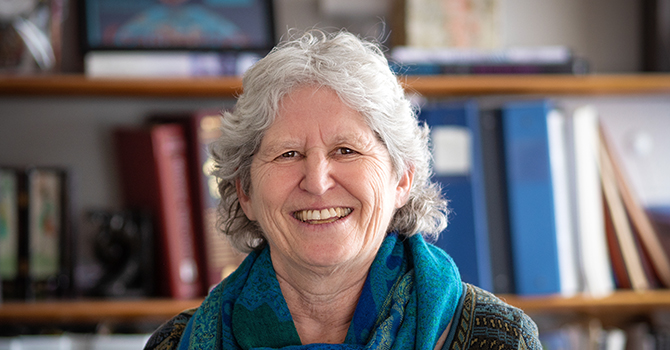Thinking Slow, Living Resilient, and Making a Difference

Betsy Foxman
Hunein F. and Hilda Maassab Professor of Epidemiology, Director of the Center for Molecular and Clinical Epidemiology of Infectious Diseases
As an undergraduate at the University of California, Berkeley, Betsy Foxman wandered her way through the humanities. “I had been a music major and then a French major before deciding I really wanted to do more science,” she says. It wasn’t exactly the start you might imagine for a prominent epidemiologist.
She landed on conservation of natural resources. “They had just started CNR. It was attractive to me because even then I was interested in the environment and in—what I didn’t know at the time was—public health.”
The driving question for Foxman was how conditions inside and outside the human body affect an individual’s health and disease patterns across the population.
The driving question for Foxman, one that still fascinates her today, was how conditions inside and outside the human body—our many human environments—affect an individual’s health and disease patterns across the population. With a creative academic advisor and a bit of luck, she ended up taking a course in epidemiology. “I absolutely loved that course. I thought, ‘this is me.’ Lectures were about infectious disease and outbreak investigations! It put together the things I was most interested in and gave me the sense that I could make a difference in other’s lives.”
Foxman earned master’s and doctoral degrees in epidemiology from UCLA and soon after began her teaching and research career at Michigan Public Health.
Teaching Resilience
Foxman enjoys helping students figure out how to solve problems. “In elementary school, we read a book called The Hole in the Wall, a story of resilience that has resonated with me my entire life. The idea is that when you face adversity, there’s always a hole in the wall—a way to get through.”
Foxman leans on the book’s optimistic realism in helping her students face adversity. “I emphasize not how we’ll figure things out—that’s mostly for them to decide—but that we’ll figure things out. It’s combining confidence and support with an acknowledgment that viable solutions require work.”
“Becoming a professional scientist means you have to learn how to solve problems.”
And that, says Foxman, also helps them become better epidemiologists. “Scientific work is often about figuring out what’s next, discerning how to manage a failure and moving on to a new question. Becoming a professional scientist means you have to learn how to solve problems.”
Even as Foxman challenges her students—helping them learn how to tolerate failure while looking for that hole in the wall—she also unabashedly relishes their successes. “To watch them become trained, creative problem-solvers who want to help others—it’s the best!”
Science Thinks Slow
Foxman frames the role of science in society in terms of thinking fast and thinking slow. “The luxury—if you can call it that—of being a scientist is that you often can think slow about things and be careful about your work. As epidemiologists, of course, we sometimes need answers quickly, like with a disease outbreak. But with human populations, in general we have to do something for a long time and study many different populations to truly understand.”
Thinking slow is one reason public policy is such an important part of public health work. “Government protects the public good and designs policy to ensure a healthier public. Business isn’t always willing to do that,” Foxman says.
“I work hard to make it clear that I’m planning to spend another 10 years doing more studies like this one, that I’m not settled on these answers myself.”
The media and the general public also struggle at times to think slow with science in order to understand the limitations of research. “Sometimes we hesitate to release the results of a study, knowing the media might make a bigger deal out of it than it is and that people might start changing behaviors based on a single study,” Foxman notes. “I work hard to make it clear that I’m planning to spend another 10 years doing more studies like the one I just finished, that I’m not settled on these answers myself. But it can be difficult to be nuanced when you’re trying to explain your work to the general public. It’s a skill I’m still working at myself after all these years!”
Foxman discusses with her students the importance of translating science. “Our students want to make the world a better place and are willing to work really hard for it. In training them for public health careers, we have to make sure they’re equipped not only to do excellent science but to be able to talk about their work with a variety of people. So even as they’re learning to think slow about science, they do have to be ready to translate. Good scientific communication is one of the fastest ways we can make a big impact on the public’s health.”
